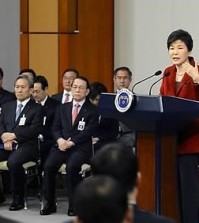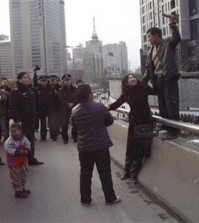- California Assembly OKs highest minimum wage in nation
- S. Korea unveils first graphic cigarette warnings
- US joins with South Korea, Japan in bid to deter North Korea
- LPGA golfer Chun In-gee finally back in action
- S. Korea won’t be top seed in final World Cup qualification round
- US men’s soccer misses 2nd straight Olympics
- US back on track in qualifying with 4-0 win over Guatemala
- High-intensity workout injuries spawn cottage industry
- CDC expands range of Zika mosquitoes into parts of Northeast
- Who knew? ‘The Walking Dead’ is helping families connect
Park proposes 3-nation nuclear safety body
By Yi Whan-woo
South Korean President Park Geun-hye proposed forming a nuclear safety body with China and Japan Thursday as a way of tackling regional distrust and confrontation.
“Northeast Asia hosts many nuclear power plants with their safety being a big issue to people in the region,” the President said during the 69th Liberation Day, also marking the Allies’ defeat of Japan.
Park explained the envisioned nuclear safety body would follow the model of the 28-member European Atomic Energy Community (Eurotom) in particular, and European Union on a larger scale.
“Cooperation could cover other areas such as disaster rescue, climate change and drugs,” Park said, referring to her Northeast Asia Peace Initiative, which she unveiled last year. She left open the door for North Korea, Russia, Mongolia and the United States to participate.
Fear of radiation has been spooking Japan following a nuclear leak in Fukushima after it was hit by a tsunami in 2011.
In addition to 21 reactors that already have been in operation, China is building 28 new nuclear reactors, according to the International Atomic Energy Agency (IAEA).
South Korea is working on five new reactors, Japan with two, the U.S. with five and Russia with 10. Uranium-rich Mongolia has been pushing to set up nuclear energy plants. North Korea’s nuclear threat is a major security issue in the region.
The President asked Pyongyang to join a U.N. conference to be hosted by South Korea in October as a part of efforts to remove such threats and enhance inter-Korean relations.
The 12th meeting of the Conference of the Parties to the Convention on Biological Diversity, known as COP 12, will be held in Pyeongchang, Gangwon Province from Oct. 6 -14.
The representatives from 194 governments as well as non-governmental organizations are anticipated to attend to discuss sustainable development.
Park said the U.N. meeting will offer an opportunity for the two Koreas to work together on ecological restoration and preservation on the heavily fortified border between them.
“It is abnormal for us to continue to live under nuclear threats posed by our northern neighbor,” she said. “North Korea must give up its nuclear programs and come forward to join the international community.”
Park invited Japan to participate in marking the 70th Liberation Day next year in order to make a new beginning from the past. Chinese President Xi Jinping made a similar proposal to Park during his visit to Seoul. Park’s proposal was met with Japanese Prime Minister Shinzo Abe’s show of respect and visits by politicians to Yasukuni Shrine, where top World War II convicted criminals are enshrined.
















